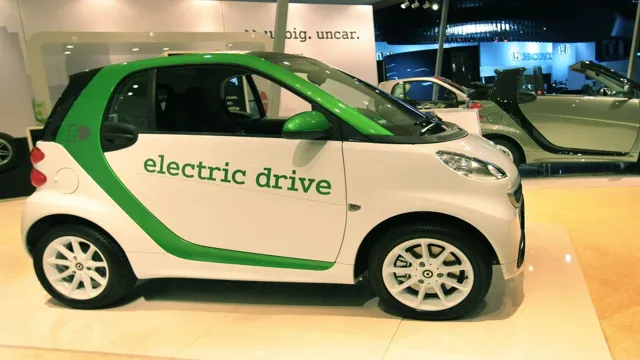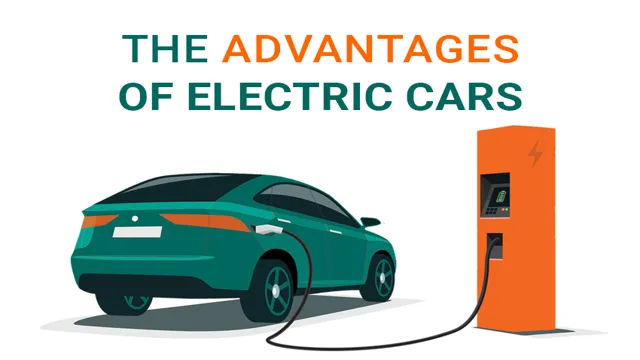Electric Cars and Benefit in Kind Tax: Exploring the Cost-Saving Benefits of Going Green
Electric cars have been making waves in the automotive industry for quite some time. The shift towards electric vehicles has been majorly driven by the need to reduce carbon emissions and address the issue of climate change. However, aside from their eco-friendliness, electric cars also come with other benefits that are often overlooked.
One of these benefits is the impact they have on tax. Specifically, electric cars can bring significant savings when it comes to Benefit in Kind tax. In this blog, we dive into the world of electric cars and Benefit in Kind tax, exploring how you can make savings by choosing an electric vehicle.
Overview of Benefit in Kind Tax
Electric cars have gained popularity over the years, and it’s no secret that they are more environmentally friendly and cost-effective than traditional cars. However, it’s important to note that benefit in kind tax on electric cars is applicable just like it is on traditional cars. Benefit in kind tax refers to the tax paid on any benefits that are provided by an employer to their employees.
For instance, if an employer offers an electric company car to an employee for private use, the employee will be liable to pay a benefit in kind tax on the car. The actual amount of tax paid will depend on several factors such as the car’s value, the CO2 emissions, and so on. It’s essential to understand that benefit in kind tax on electric cars is lower compared to traditional cars, making them a popular option among employees and employers alike.
Definition of Benefit in Kind Tax
Benefit in Kind Tax Benefit in Kind (BIK) tax refers to the taxes paid on any non-cash benefits received by an employee from their employer. These non-cash benefits may include company cars, health insurance, housing allowance, or any other benefits that an employee may receive in addition to their salary. The purpose of BIK tax is to ensure that employees are paying taxes on all sources of income, including the non-cash benefits that they receive.
Employers are responsible for calculating and deducting BIK tax from their employees’ salaries, and they must report the total BIK tax deducted to the tax authorities. The amount of BIK tax paid by an employee will depend on the value of the non-cash benefits they receive from their employer. Overall, BIK tax plays a crucial role in ensuring that individuals are paying their fair share of taxes, irrespective of the source of their income.
How it applies to company cars
When it comes to company cars, one of the most important things to consider is the Benefit in Kind (BIK) tax. This tax applies to employees who use a company car for personal use, and it’s calculated based on the car’s value, CO2 emissions, and fuel type. Essentially, the amount of BIK tax an employee owes is based on how much benefit they receive from using the car.
For example, if an employee has access to a luxury car with high emissions and uses it for personal trips, they’ll owe more BIK tax than an employee who uses a more modest car with lower emissions. Companies must keep accurate records of each employee’s car usage and report it to HM Revenue and Customs to ensure compliance with BIK tax laws. Understanding how BIK tax works is essential for businesses that provide company cars to their employees.
By staying up-to-date on BIK tax rates and regulations, companies can avoid costly penalties and ensure that their employees are taxed fairly.
Advantages of Electric Cars for Benefit in Kind Tax
One of the best advantages of electric cars for benefit in kind tax is that they are environmentally friendly. Electric cars produce zero or low emissions, making them less harmful to the environment and contributing to a cleaner, healthier planet. This is a huge benefit for individuals, businesses, and governments looking to reduce carbon emissions and mitigate climate change.
Additionally, electric cars are cost-effective, with lower tax rates for those who own or lease one. In fact, a company car driver can save thousands of pounds by switching to an electric car, as they are subject to much lower benefit in kind tax rates compared to conventional petrol or diesel vehicles. So not only are electric cars great for the environment, but they can help reduce costs and save money in the long run as well.
All in all, there is no doubt that electric cars are becoming a more viable option as the world moves towards a greener future, and they offer a range of benefits, including tax savings for those who choose to invest in them.
Lower emission rates and tax brackets
Electric cars come with numerous benefits, and one of these benefits is their lower emission rates, which lead to lower tax brackets. Benefit in Kind Tax is a tax levied on the benefits employees receive from their employers, such as company cars. Embracing electric cars thus reduces the Benefit in Kind tax bill since they fall into a lower tax bracket.
This means considerable savings for both employers and employees in terms of their tax expenses. Additionally, electric cars’ environmental efficiency means that they have less polluting emissions compared to their gasoline-powered counterparts. This is appealing as eco-friendliness continues to be a top priority for many people.
Furthermore, lower CO2 emissions mean reductions in overall carbon footprints, which is a win for everyone. In summary, adopting electric cars guarantees both financial and environmental benefits.
Reduced fuel and maintenance costs
One of the biggest advantages of electric cars for Benefit in Kind Tax is the reduced fuel and maintenance costs. Since electric cars run on electricity, there is no need to purchase fuel. This results in significant savings, especially for businesses with large fleets of vehicles.
Additionally, electric cars require less maintenance compared to traditional gasoline cars. EVs have fewer moving parts, which means there is less wear and tear on components such as the engine, transmission, and brakes. This translates to lower repair costs, saving businesses even more money in the long run.
Another advantage of electric cars is that they offer a better driving experience with smooth acceleration, reduced noise and vibration, and instant torque. As the world transitions to a more sustainable future, electric cars are becoming an increasingly attractive option for both companies and individuals looking to reduce their carbon footprint. So, when it comes to Benefit in Kind Tax, electric cars are certainly worth considering as they offer lower fuel and maintenance costs while also delivering on performance and sustainability.
Exemption from certain taxes and charges
Electric cars come with a host of advantages, one of which includes exemption from certain taxes and charges. In particular, employees who receive electric company cars can benefit from a reduced Benefit in Kind tax. With the rising popularity of electric cars, this has become an increasingly attractive incentive for businesses looking to invest in greener transportation options.
This tax break serves as an excellent motivator for employees to choose an electric car over a traditional gasoline-powered vehicle, ultimately contributing to reducing carbon emissions and promoting sustainable living. Moreover, electric cars are also exempt from road tax and incur lower fuel costs, making them an economical choice as well as an environmentally-conscious one. With such economic and environmental benefits, it’s easy to see why electric cars are becoming a preferred choice for businesses and individuals alike.
Calculating Benefit in Kind Tax for Electric Cars
If you’re thinking of getting a company car, you’ll need to factor in the benefit in kind tax when considering an electric vehicle. Benefit in kind tax is based on the value of the car, which includes any extras like leather seats or a sunroof. For electric cars, the benefit in kind tax is calculated differently.
Instead of being based on the car’s value, it’s based on its emissions. Electric vehicles currently have 0% benefit in kind tax, making them a much more attractive option for company car drivers. This means you’ll pay no extra tax on an electric car, unlike petrol or diesel cars, which can incur significant additional costs.
It’s worth noting that this may change in the future as the government looks to incentivize electric car usage and mitigate the impact of climate change.
Factors that affect benefit in kind tax
Calculating benefit in kind tax for electric cars requires considering a range of factors that influence the final tax amount. One such factor is the list price of the electric car, which forms the basis of the tax calculation. The list price includes the cost of the vehicle, any optional features, and delivery fees.
Additionally, the electric car’s CO2 emissions must be taken into account, as the lower the emissions, the lower the tax. Another factor is the vehicle’s battery capacity, as cars with larger batteries often attract a higher benefit in kind tax rate. Generally, the higher the battery capacity, the longer the range and the more expensive the car.
Moreover, the tax rate also depends on the car’s lease or purchase price, the employee’s income tax rate, and the type of charging used. Therefore, it is crucial to understand how these factors affect benefit in kind tax rates when purchasing or leasing an electric car for business purposes. Ultimately, this will help individuals make informed decisions that can significantly reduce their tax liability.
Example calculations and comparison to traditional cars
If you’re thinking of purchasing an electric car, one factor to consider is the Benefit in Kind (BIK) tax. BIK tax is the tax payable on benefits employees receive from their employer, which includes company cars. The BIK tax for electric cars is significantly lower than traditional cars because electric cars produce zero emissions, making them more environmentally friendly.
To calculate BIK tax for your electric car, you’ll need to know its list price, CO2 emissions, and the employee’s tax rate. For example, a Tesla Model 3 with a list price of £40,000 and 0g/km CO2 emission would have a BIK tax rate of just 1% in the tax year 2021/22 for employees with a tax rate of 20%, resulting in a BIK tax liability of £400 per year, compared to a traditional petrol or diesel car with a much higher BIK tax rate. By switching to an electric car, employees can save a significant amount of money on BIK tax, while also reducing their carbon footprint.
Conclusion and Future Implications
In conclusion, the benefit in kind tax on electric cars is a win-win situation. Not only does it incentivize individuals to choose more eco-friendly transportation options, but it also ensures that they are rewarded for their efforts with significant savings on their tax bills. So while gas-guzzling cars may be flashy and cool, the smart money is on electric cars, not only for the sake of the environment but also for your wallet’s benefit in kind.
Let’s charge ahead into a greener future together!”
FAQs
How is the benefit in kind tax calculated on electric cars?
The benefit in kind tax on electric cars is calculated based on the vehicle’s list price and CO2 emissions.
Are electric cars exempt from benefit in kind tax?
No, electric cars are not completely exempt from benefit in kind tax, but they do receive a reduced rate compared to petrol and diesel cars.
Is the benefit in kind tax on electric cars expected to change in the future?
Yes, the benefit in kind tax on electric cars is likely to change in the future as the government aims to incentivize the use of electric vehicles.
How can employers reduce the benefit in kind tax on electric cars for their employees?
Employers can reduce the benefit in kind tax on electric cars by providing workplace charging facilities and limiting the private use of the car. This can help to lower the car’s taxable value and therefore reduce the tax liability.


